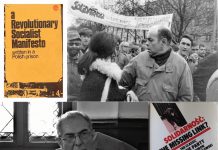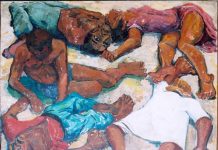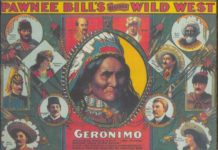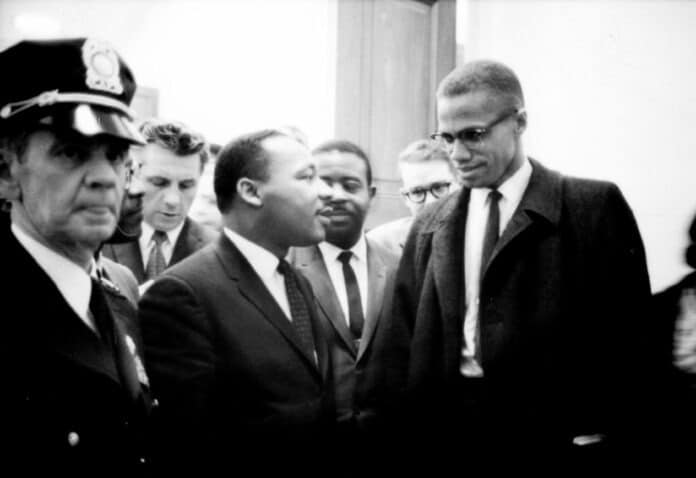
Linkbox om den militante sorte muslimske leder Malcolm X
Den sorte muslimske leder Malcolm X myrdes i New York 21. februar 1965, for 50 år siden. (Født 19.5.1925 som Malcolm Little i Omaha, Nebraska). Vi har samlet links om og med Malcolm X.
The black muslim leader Malcolm X was gunned down in New York fifty years ago, 21 February 1965. (He was born 19 May 1925 as Malcolm Little in Omaha, Nebraska). This is a collection of links about and with Malcolm X.
Contents:
- Leksikalt/Encyclopedias
- Sites
- Artikler på dansk
- Bøger
- Books (+ reviews)
- Articles in English
- Video/audio
- Se også/See also
Leksikalt/Encyclopedias:
- Black Power. Af Helge Rønning (Leksikon.org).
- Malcolm X (Denstoredanske). Kortere dansk biografisk artikel.
- Malcolm X (Wikipedia.dk).
- Malcolm X. Af Lasse Skytt (Faktalink.dk, 2021). Kræver login via biblioteket.
In English:
- Malcolm X (Wikipedia.org).
- Malcolm X. By John Simkin (Spartacus Educational).
- Assassination of Malcolm X (Wikipedia.org)
Se også/See also:
- Malcolm X Movement (Facebook).
Sites:
- Malcolm X (Malcolm.com). Biography, Chonology and Photograps.
- Malcolm X (1925–1965) (World History Archives; Hartford Web Publishing). Articles by/about Malcolm X + Resources for the study of Malcolm X.
- The Smoking Gun: The Malcolm X files (Thesmokinggun.com). A detailed accounting of the assassination of Malcolm X.
- Malcolm – Malcolm’s Legacy (Brothermalcolm.net). With Index, Cronology, Family, Speeches, Photographs, Bibliography, Webliography, Study Guide … etc.
- Malcolm X Reference Archive (Marxists Internet Archive). With Text + Audio (app. 10) + Essays on Malcolm X + Links.
Artikler på dansk:
Krav om ny kulegravning af mordet på Malcolm X i 1965. Af Malik Miah (Socialistisk Information, 4. marts 2021). “Familiemedlemmer til den revolutionære sorte leder Malcolm X har offentliggjort et brev skrevet af en tidligere undercoveragent, som fortæller, at New Yorks Politi og FBI stod bag mordet den 21. februar 1965.”
Inspirationen fra Malcolm X: Politik handler om analyser, håb og konkrete handlinger. Af Filip Soos (Modkraft/Kontradoxa, 3. april 2014). Om 50-årsdagen for Malcolm X’s tale »The Ballot or the Bullet«. Links til video- og tekst-udgaver.
Se også Wikipedia.org med 45 sec. audio.
Video: YouTube.com (53 MIN.): Malcolm X’s Legendary Speech: Cleveland 3. April 1964 (annotations and subtitles). See Full Text (document).
Malcolm X . Af Søen Aagaard (Alt om historie, 30. marts 2011). “Den militante borgerrettighedsaktivist Malcolm X blev skudt foran en tilskuerskare i New York i februar 1965. Politiet fik straks …”
Malcolm X: liv om meninger. Af Mads Bruun Pedersen (Socialistisk information, nr. 55, 1992). “Malcolm X’s politiske udvikling som talsmand for den islamiske organisation “Islam Nation” og som forkæmper for de sortes rettigheder.” Ikke online p.t.
Malcolm X – sort revolutionær. Af Jens Loller (International Socialisme, nr.3, december 1992). Anmeldelse af Kevin Ovendens bog: Malcolm X – Black Nationalism and Socialism (1992), se Books.
Bøger:
Malcolm X: Selvbiografi. Skrevet med bistand a Alex Haley. Med efterskrift af Alex Haley (Gyldendals Logbøger, 1971, 438 sider). 2. udgave: Efterskrift ved Erik Thygesen (Per Kofod, 1993, 462 sider).
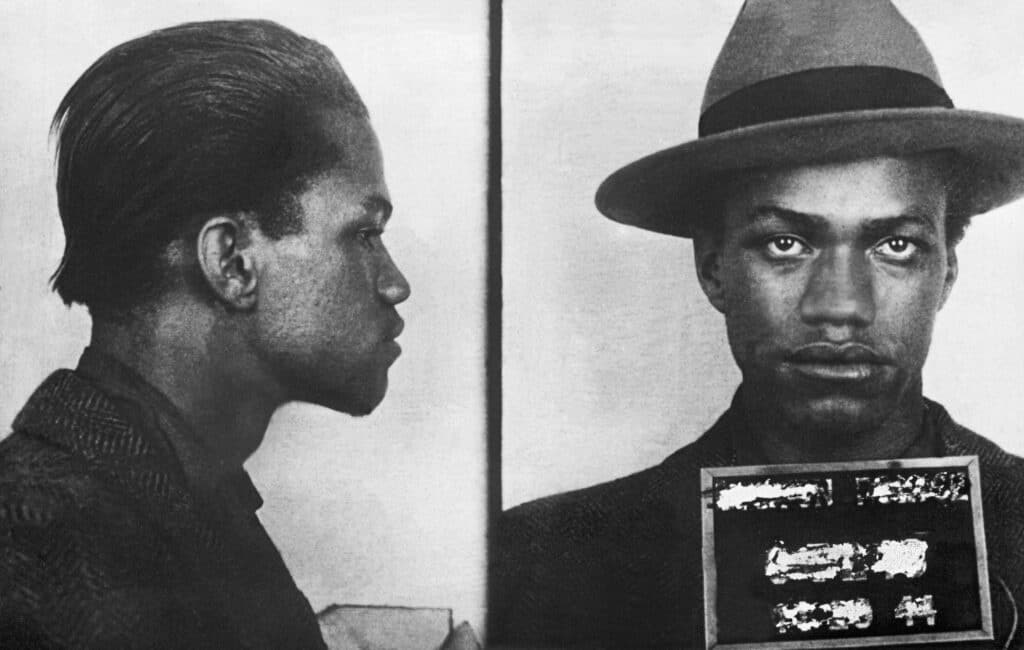
Books:
The Dead Are Arising: The Life of Malcolm X. By Les Payne and Tamara Payne (Norton/Liveright, 2020, 640 p.). “The book is based on decades of painstaking research by Les Payne, an acclaimed journalist who died before it was completed in 2018. His daughter Tamara, his primary researcher, transcriber and collaborator, completed the book.” See review by Malik Miah: Bringing Malcolm to life (Against the Current, Issue 212, May-June 2021).
A Rebel’s Guide to Malcolm X. By Anthony Hamilton (Bookmarks, 2016, 64 p.). See review by Ruby Hirsch (Socialist Review, Issue 415, July-August 2016).
Malcolm X: A Life of Reinvention. By Manning Marable (Allen Lane, 2011, 608 p.). “Malcolm X will stand as the definitive work on one of the most iconic figures of the twentieth century, a man who constantly strove, in the great American tradition, to remake himself anew.”
Reviews:
- Where was Malcolm X going? By Hugo Pierre (Socialism Today, Issue 154, March 2012).
- Manning Marable and Malcolm X: The power of biography. By Clarence Lang (Against the Current, Issue 154, September-October 2011).
- Evolution not ’Reinvention’: Manning Marable’s Malcolm X. By Malik Miah (Against the Current, Issue 154, September-October 2011).
- The many lives of Malcolm X. By Brian Richardson (Socialist Review, June 2011).
- Beyond the legend of Malcolm X. By Brian Jones (SocialistWorker.org, May 24, 2011). Næsten identisk med denne lidt længere/almost identical with: Myth and Malcolm (International Socialist Review, Issue 78, July–August 2011).
- The missing Malcolm (International Socialist Review, Issue 63, January-February 2009). An interview with Manning Marable about his new comprehensive biography of Malcolm X.
- See also: Manning Marable was a pioneering black Marxist. By Paul Heideman (Jacobin, July 1, 2020).
The Portable Malcolm X Reader. By Manning Marrable and Garett Felber (Penguin Books, 2013, 656 p.).
Malcolm X – Socialism and Black Nationalism. By Kevin Ovenden (Bookmarks, 1992, 95 p.).
Articles in English:
Malcolm X (Socialist Worker, UK). With 12 articles about Malcolm X (2002-2020).
Series: The legacy of Malcolm X (SocialistWorker.org, February 2015). “Lee Sustar examines the politics of Malcolm X as they were shaped by the world of struggle around him—and their meaning for today’s struggles.”
King’s real view of Malcolm X. By Malik Miah (Against the Current, Issue 229, March-April 2024). “An important revelation King: A Life is the author’s discovery of King’s real view of Malcolm X. Eig’s research exposes a false narrative circulated in political and academic circles. As Eig reveals, King and Malcolm were more similar in outlook than most people believed.”
Malcolm at the Audubon Ballroom. By Fred Gardner (CounterPunch, November 26, 2021). “Two men framed for killing Malcolm X on February 21, 1965, Muhammad Aziz and Khalil Islam, have been exonerated after all these years.”
See also Malik Miah: FBI’s leading role in Malcolm X murder: two convictions overturned (Solidarity, December 12, 2021).
When Malcolm met Ali. By Eileen Jones (Jacobin, September 30, 2021). “A new Netflix documentary, Blood Brothers, offers a moving look at the friendship between Malcolm X and Muhammad Ali, two of the 20th century’s most dynamic figures. When black-and-white photos of the pair grace the screen, it practically vibrates with energy.”
‘Well, what do you mean, we can’t join the Klan?’ By Les Payne and Tamara Payne (Politico, October 10, 2020). “Inside the bizarre, secret meeting between Malcolm X and the Ku Klux Klan.” Excerpted from their book, The Dead Are Arising: The Life of Malcolm X (Norton/Liveright, 2020); see above.
The murder of Malcolm X. By Joel Whitney (Jacobin, July 17, 2020). “There was nothing J. Edgar Hoover feared more than a charismatic black radical who could inspire the oppressed to fight back. And that’s why, according to a compelling new series, the FBI had its fingerprints all over Malcolm X’s murder.”
The missing Malcolm X. By Garrett Felber (Boston Review, November 28, 2018). “Our understanding of Malcolm X is inextricably linked to his autobiography, but newly discovered materials force us to reexamine his legacy.”
If only we could revive the fruitful tension between Martin Luther King and Malcolm X. By Kenan Malik (The Guardian, 8 April 2018). “Reflections on Dr King’s death have overlooked how his liberal universalism and Malcolm X’s separatism gave each other strength.”
The legacy of Malcolm X. By Ahmed Shawki (Jacobin, 21 Februar 2016). “Malcolm X died fifty-one years ago today, just as he was moving toward revolutionary ideas that challenged oppression in all its forms.” Extract from Shawki’s book Black Liberation and Socialism (Haymarket, 2005).
Malcolm X: A half century later. By Alan Stowers (New Politics, Issue 59, Summer 2015). “Half a century after Malcolm X’s assassination, this nation has produced no comparable political or intellectual leader.”
Malcolm X: The road to revolution (Socialist Review, Issue 399, February 2015). “This month marks the 50th anniversary of the murder of Malcolm X. Antony Hamilton looks at his life and politics.”
When we invited Malcolm X to Smethwick (Socialist Worker, Issue 2441, 17 February 2015). “Avtar Singh Jouhl invited Malcolm X to Smethwick days before his assassination fifty years ago. He spoke to Ken Olende about the visit’s impact on the fight against racism.”
Call for global resistance (Socialist Review, Issue 399, February 2015). “Saladin Ambar, author of Malcolm X at the Oxford Union, spoke to Socialist Review about Malcolm’s historic 1964 speech, and why his ideas will remain relevant as long as oppression persists.”
Malcolm X: Fighter for Black Liberation (Socialist Action, July 24, 2011). Taken from the Socialist Action pamphlet, 1988.
Malcolm X and American Trotskyism. By Louis Proyect (The Unrepentant Marxist, November 12, 2010). “But my first exposure to Black militancy was Malcolm X speaking at a Militant Labor Forum on January 7th 1965 held at the Palm Gardens in New York.”
The undiscovered Malcolm X: Stunning new info on the assassination, his plans to unite the civil rights and black nationalist movements & the 3 ‘missing’ chapters from his autobiography (Democracy Now! February 21, 2005). Also as Audio, Text and Video. Links to Malcolm X on Democracy Now! See his Speaches, interview with activist and biographer Manning Marable.
Interview with Malcolm X. By Barry Sheppard (Links: International Journal of Socialist Renewal). Taken from a chapter of volume one of a political memoir, covering the years 1960-1973. “Malcolm X was the greatest person I have ever met.”
America’s black shinning prince (Socialist Review, Issue 294, March 2005). “Mike Davis pays tribute to Malcolm X, killed forty years ago.”
Malcolm X: Legacy of a revolutionary (Socialist Worker, US, Issue 331, February 18, 2005). “Lee Sustar looks at Malcolm X and the relevance of his ideas 40 years after his assassination.”
Malcolm X, 40 years after the death of a revolutionary. By Ray Smith (In Defence of Marxism, 22 February 2005). “More than one or two breathed a sigh of relief at the top of the US establishment. One of the loudest voices against injustice had been lost.”
Malcolm X – His Legacy (Monthly Review, Vol.56, No.9, February 2005). “The life of Malcolm X, who was murdered forty years ago this month, spanned a trajectory from oppression and victimization to inchoate rebellion and revolutionary autonomy”:
The Achievement of Malcolm X. By John J. Simon.
Interview with Malcolm X : Malcolm X interviewed by A. B. Spellman.
The Murder of Malcolm X. By Jigs Gardner.
The transgression of a laborer: Malcom X in the wilderness of America. By Ferruccio Gambino (Radical History, Issue 55, 1993, p.7-31; online at Libcom.org). “Analysis of the development of Malcolm X’s thought, from prison and the factory through to the Nation of Islam, and its deviation from the traditional state-allocated path of ethnic leadership.”
Malcolm X, black nationalism and socialism. By George Novack (International Socialist Review, Vol.28 No.4, July-August 1967, p.43-51; online at Marxists Internet Archive). Review of George Breitman, The Last Year of Malcolm X: The Evolution of a Revolutionary (Merit Publishers, 1967).
Myths about Malcolm X: A speech (International Socialist Review, Vol.28, No.5, September-October 1967, p.43-60; online at Marxist Internet Archive). “George Breitman gave this speech at the Detroit friday Night Socialist Forum, March 17, 1967.”
Video:
Tariq Ali on Malcolm X at Oxford (YouTube.com, 14:09 min.). Speech at the Rosa Luxemburg Stiftung—New York Office, February 14, 2015, about the impact of Malcolm X’s debate at Oxford University in 1964.
Remembering Malcolm X on his 89th birthday (PopularResistance.org, May 19, 2014). “Some video showing Malcolm X in his own voice.”
Malcolm X: Our history was destroyed by slavery (YouTube.com, 8:48 min.). “My father didn’t know his last name. My father got his last name from his grandfather and his grandfather got it from his grandfather who got it from the slavemaster. The real names of our people were destroyed during slavery. The last name of my forefathers was taken from them when they were brought to America and made slaves, and then the name of the slavemaster was given, which we refuse, we reject that name today and refuse it. I never acknowledge it whatsoever …”
Malcolm X – The House Negro and the Field Negro (YouTube, 23:17 min.). See also: Malcolm X: House Negro + Wikipedia-article. Short version: YouTube.com, 1:57 min.)
RBG-Malcolm X, By Any Means Necessary. Full Speech & Text (YouTube.com, 2:00:12 min.)
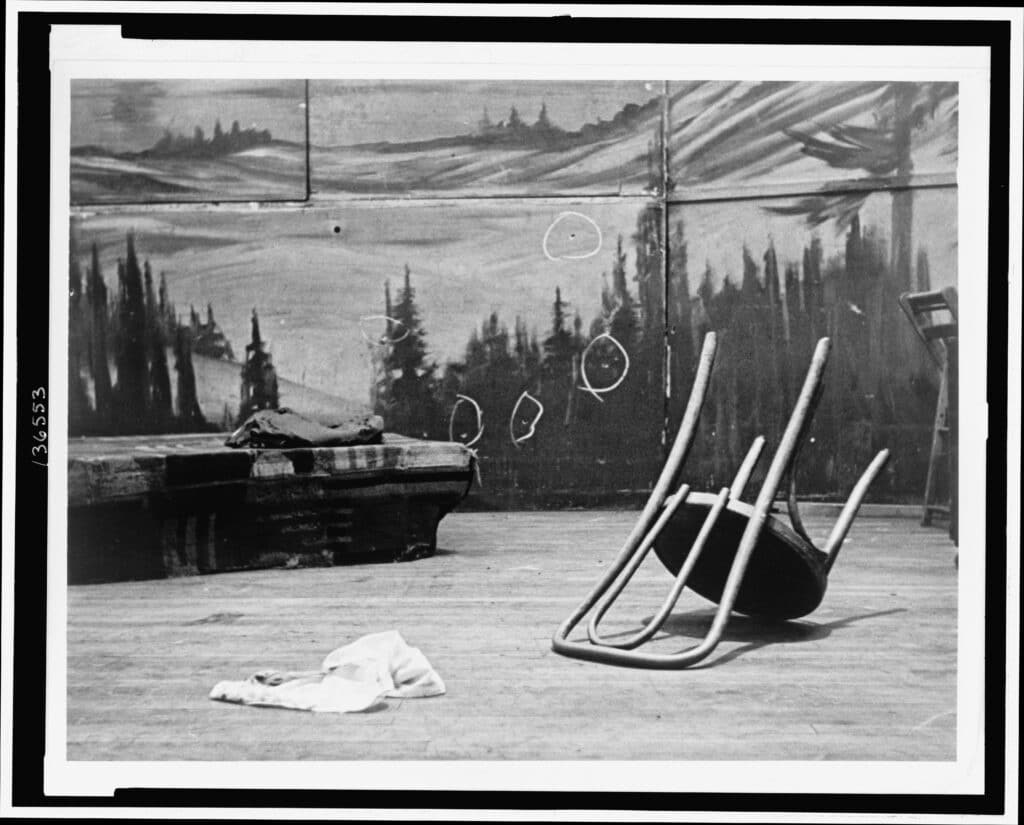
Se også / See also:
Nation of Islam. Af Daniell Marcussen (Kandidatopgave i historie, AUC, 2007, 25 sider; online på Scribd.com). In Danish.
A proletarian critique of the Nation of Islam (Libcom.org, August 16, 2006, 26 pages). “The pamphlet looks at NOI’s history and evolution, the way it exploits its membership and its promotion of anti-working class, sexist, homophobic and racist ideology.”
Se også på Socialistisk Bibliotek:
Linkbox: Black Power: Historie og personer – links on the Black Power movement, its history & leading figures.
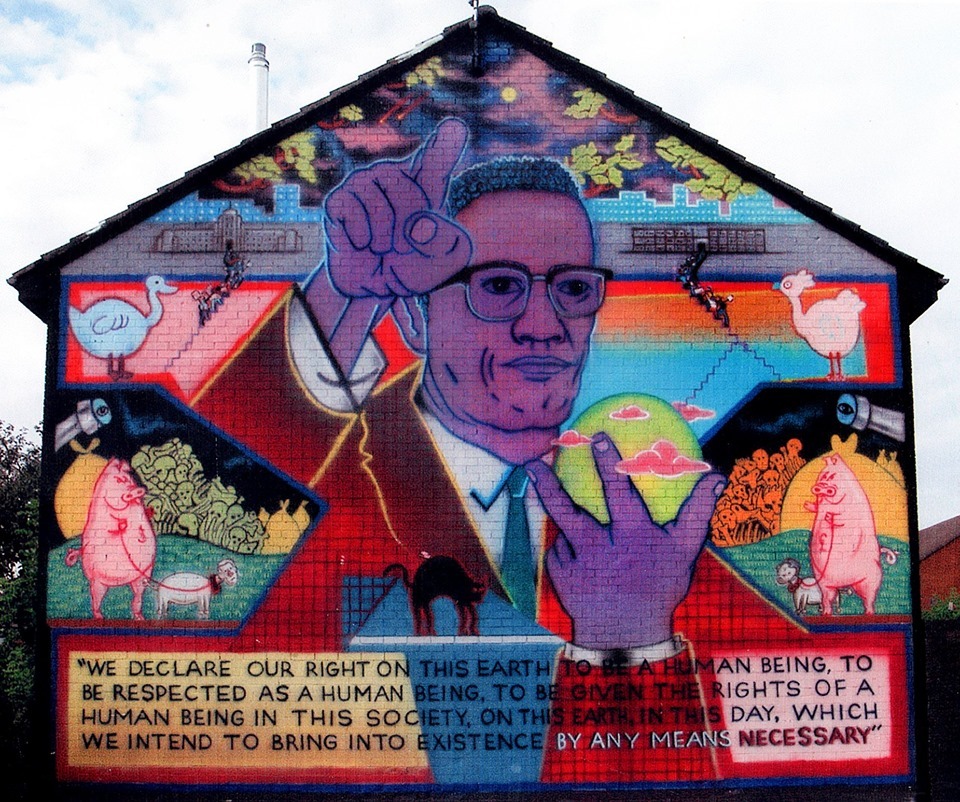
23 July 2002. (CC BY-SA 4.0). Source: Wikimedia Commons.
















